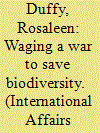| Srl | Item |
| 1 |
ID:
133283


|
|
|
|
|
| Publication |
2014.
|
| Summary/Abstract |
The rhino-poaching crisis in South Africa raises questions about whether it should be tackled through judicial processes or by the application of hard-power methods. The poaching of wildlife has traditionally been met with a harsh response to send a clear message of punitive deterrence. While the reaction of the South African authorities has been no different, the contemporary threat posed by poaching intersects with, and is complicated by, wider concerns such as border security and immigration. In many respects, this has led to what can be termed the 'rhinofication' of South African security. South Africa has a long political tradition that relies on force rather than dialogue, negotiation and reform. Yet, the hard-power response to protect the rhino and other large fauna, though necessary at one level, often runs up against the economic frustrations and temptations of a large, predominantly black, under-class, which for generations has been excluded from wildlife management and conservation by white 'exceptionalism'. Poachers are thus transformed through their counter-cultural actions into what Eric Hobsbawm termed 'social bandits'. While this social chasm lies at the heart of the 'rhino wars', it is clear that in practical terms the lack of a political/poaching settlement in the form of a racially inclusive conservation strategy almost certainly guarantees their continuation.
|
|
|
|
|
|
|
|
|
|
|
|
|
|
|
|
| 2 |
ID:
133284


|
|
|
|
|
| Publication |
2014.
|
| Summary/Abstract |
This article examines the rise in militarized approaches towards conservation, as part of a new 'war for biodiversity'. This is a defining moment in the international politics of conservation and needs further examination. The claims that rhinos and elephants are under threat from highly organized criminal gangs of poachers shapes and determines conservation practice on the ground. Indeed, a central focus of the 2014 London Declaration on the Illegal Wildlife Trade is the strengthening of law enforcement, and recent policy statements by the US government and the Clinton Global Initiative also draw the link between poaching, global security and the need for greater levels of enforcement. Such statements and initiatives contribute substantially to the growing sense of a war for biodiversity. This article offers a critique of that argument, essentially by asking how we define poachers, and if militarized approaches mean conservationists are becoming more willing to engage in coercive, repressive policies that are ultimately counterproductive. Further, this article examines how the new war for biodiversity is justified and promoted by referring to wider debates about intervention in a post-Cold War era; notably that the international community has a responsibility towards wildlife, especially endangered species, and that military forms of intervention may be required to save them.
|
|
|
|
|
|
|
|
|
|
|
|
|
|
|
|